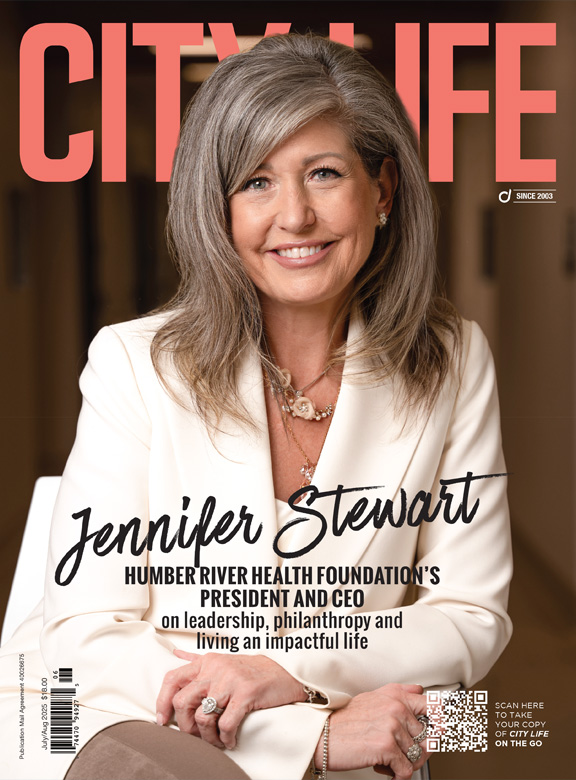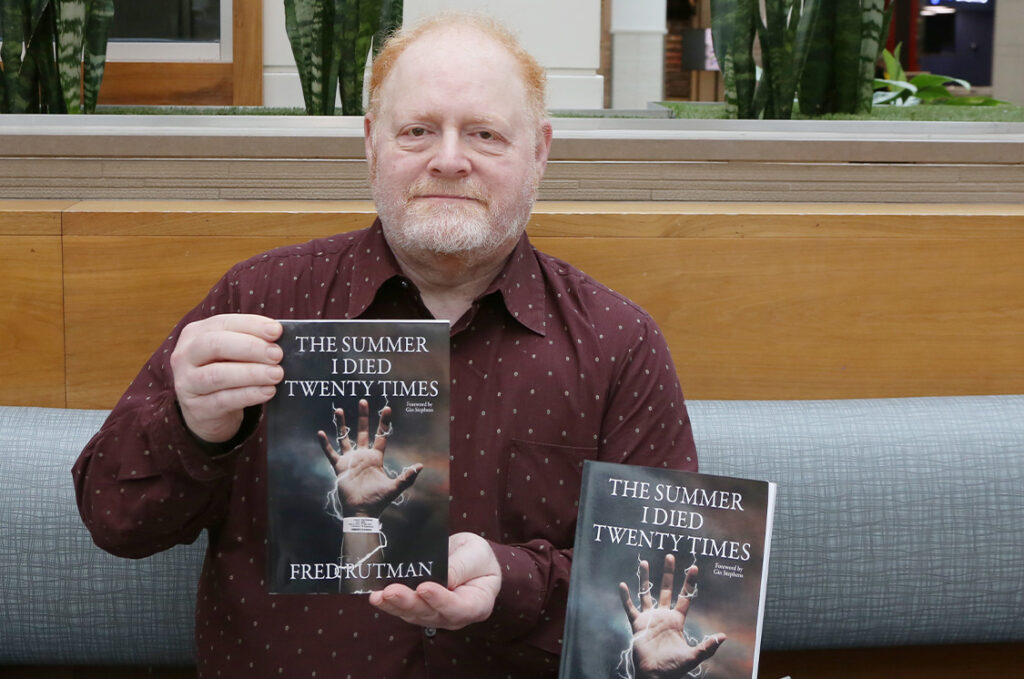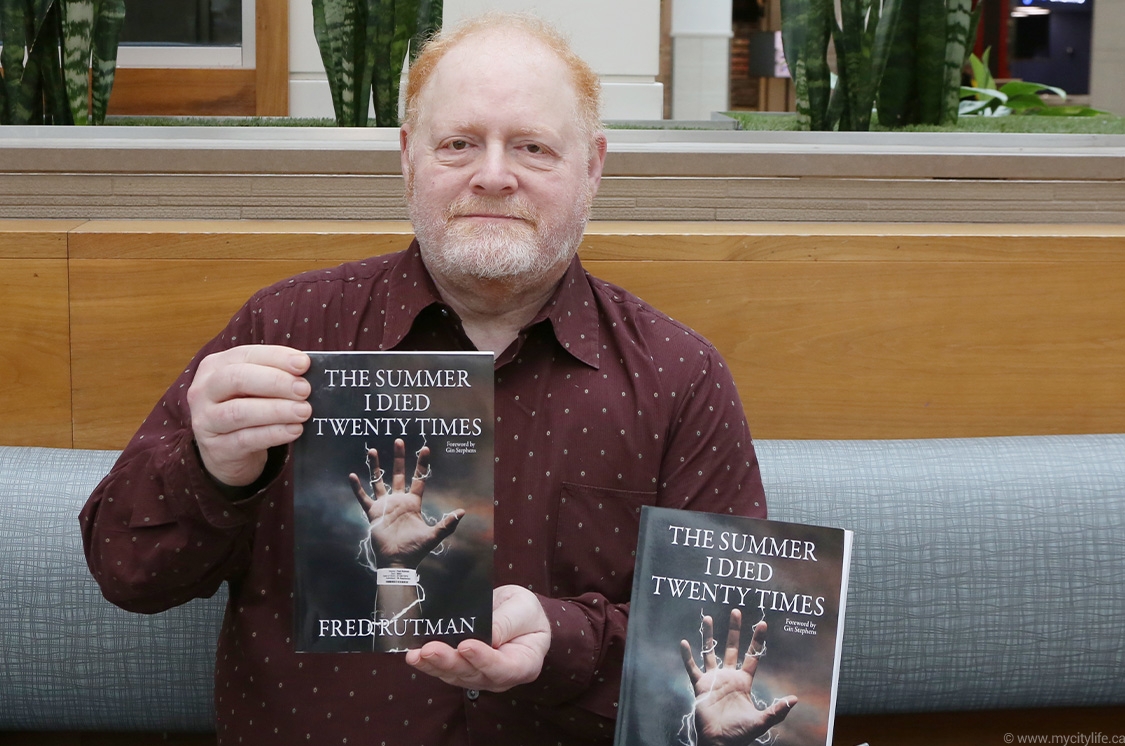Fred Rutman: The Summer I Died Twenty Times
A burning question has arisen repeatedly throughout human history: what lies beyond the threshold of death? Fred Rutman’s harrowing first-hand experiences have rendered him an expert on the matter.
Fred Rutman’s heart-stopping memoir, The Summer I Died Twenty Times: Because Sometimes Lightning Does Strike the Same Spot Twice (Black Rose Writing, 2023), has captured the world’s attention. This extraordinary memoir, in which Rutman fearlessly recounts his journey of dying and returning to life a staggering 20 times, has garnered nominations for prestigious accolades such as the Governor General’s Literary Award, the Canadian Jewish Literary Award, and the Writers’ Trust Award, cementing its status as a truly inspirational and courageous literary work and its author as the embodiment of resilience and wit.
As a young boy, Rutman’s education centred around Winnipeg’s Talmud Torah, at the time that city’s only Hebrew school. “Talmud Torah was my educational haven until sixth grade,” he reminisces. However, his memories of those years are far from positive. Struggling with undiagnosed conditions, including attention-deficit/hyperactivity disorder (ADHD), Rutman faced adversity in an era when schools were ill- equipped to comprehend such issues.“The teachers believed I only needed to apply myself to succeed,” he recalls with a tinge of bitterness. Unaware of his own learning disabilities and bearing the additional stigmas of being overweight and having red hair, Rutman endured the relentless screams of teachers who chastised him for his perceived inadequacies. Adding parochial schooling and instructors who had been moulded in the crucible of military discipline to the equation that already included his special needs produced a result that suffocated the very essence of his spirit.
Rutman’s father toiled for London Life, while his mother shouldered the responsibility of payroll at the Seven Oaks School Division. “My mother battled depression throughout her life and my father endured the most severe case of rheumatoid arthritis I have ever witnessed,” he recalls. Their lives were marked by silent struggles, a sombre backdrop to Rutman’s own tribulations.
Not until his mid-30s did Rutman receive a diagnosis for his profound physical and intellectual challenges. “I underwent testing, which revealed a severe dysfunction in the right hemisphere of my brain. Put simply, a significant portion of my right brain was malfunctioning,” he says. Yet, against all odds, he managed to graduate from high school and even pursued an MBA from the University of Winnipeg, along with a Certificate in Adult and Continuing Education (CACE) from the University of Manitoba’s Continuing Education program. “Becoming the valedictorian was never in the cards for me. Many individuals with brain trauma and learning disabilities persevere through sheer determination. Unconsciously compensating for my undiagnosed issues, I embarked on my journey without awareness until the diagnosis finally arrived. The human body possesses a remarkable ability to adapt within its limitations.” In an excerpt from his book, he reflects on his medical conditions: “At birth, I suffered a stroke that caused extensive brain trauma, eluding detection. I have a severe full atrioventricular (AV ) block, a heart condition of unknown origin. This condition disrupts the synchronization of electrical signals, causing my heart to cease its rhythm,” which it did 20 times in the summer of 2009. “I am entirely reliant on a pacemaker,” he states matter- of-factly.
Rutman’s account of dying diverges from conventional narratives such as approaching a warm light, encountering deceased loved ones, or undergoing life reviews in the presence of divine beings described in religious texts. Instead, he describes a detachment from his physical body, yet a lingering connection maintained through an ethereal cord. As his soul hovered above the lifeless vessel of his body, Rutman writes of encountering an indescribable force that relentlessly pushed him back into it, inflicting excruciating pain — a torment he endured with each subsequent death.
Perplexing indeed is the question of how someone can endure countless deaths without doctors intervening to halt this recurring outcome.“They failed me through repeated misdiagnoses, leading to my continual demise, coupled with the accompanying head trauma. They persisted in trying to prove I was suffering a heart attack,” he says. “Please understand, my intention is not to cast blame. It is simply an account of what unfolded. I do not wish to offend the doctors who may yet be needed to save my life.”
Another engrossing excerpt from Rutman’s memoir sheds light on his extraordinary journey. He recounts his first memory of what he now refers to as Fred’s 2009 Summer of Death Tour, a macabre, upbeat take reminiscent of a concert T-shirt. Initially unaware of his deaths, he only discovered the truth many weeks later, after experiencing the 17th of what would be 20 episodes. At first, he downplayed the severity of the situation, not fully comprehending the gravity of his predicament. It was only later that he realized the profound wrongness of it all.
Yet, there was no grand “Eureka!” moment that unveiled the truth. Instead, as his brain gradually healed and he recalled more details, Rutman found himself in his home office, grading economics term papers — an arduous task in itself. It was then that his mind produced a spectacle of awe-inspiring fireworks, in which competing thoughts and bewildering images exploded relentlessly, lasting what seemed like an eternity. The impacts of each explosion reverberated within him, as if an unseen force was viciously assaulting his very being. In retrospect, he’d say that the term “fireworks” was far too beautiful a description for the sheer horror he endured — he would come to call these episodes “brainquakes,”a more accurate description of the intense struggle he was undertaking to reclaim his life. They were experiences unlike any other, ones that would repeat themselves, leaving an indelible mark.
The release of Rutman’s book in March was the culmination of arduous years of writing. Initially hindered by the haunting effects of PTSD and concussion syndrome, Rutman struggled to recall moments from his own life. It was at the suggestion of a therapist that he began writing the book, using journaling as a means to recover his past. Over time, he discovered the therapeutic power of the process, especially during the isolation of the COVID era, which allowed him to consistently delve into his memories.
These days, Rutman is travelling throughout North America giving presentations about his book and medical history at colleges and Jewish organizations. In July he’ll be back in hospital, undergoing yet another heart surgery. To buy Rutman’s thrilling book, The Summer I Died Twenty Times: Because Sometimes Lightning Does Strike the Same Spot Twice, in both Kindle and paperback formats, please go to www.amazon.ca.
There are also plans for wider distribution through leading Canadian and American retailers.
@repeatedlydf












































































